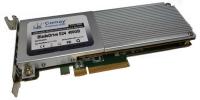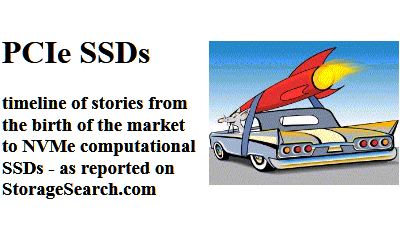 |
| leading the way to the
new storage frontier | |
... |
| ..... |
|
SSD endurance
SSD market
history
the
Top SSD Companies in Q2 2015
Exiting the
Astrological Age of Enterprise SSD Pricing
Decloaking
hidden preference segments in the enterprise
nice vs naughty -
the epic saga of flash wars in the enterprise
|
|
| . |
|
Although I couldn't
write about it at the time - in April 2015 I noticed the start of a new trend.
Military
SSDs wearing DWPD badges too.
This was a result of enterprise-like
data architectures being designed for off-grid powered systems in hostile
environments with a new design concept.
The use of native military
grade SSDs instead of repackaged (higher swap footprint) enterprise systems.
|
| toughening up DWPD | | |
|
| . |
|
 |
|
| . |
|
| 90% of the enterprise SSD
companies which you know have no good reasons to survive
|
In a
new
blog on StorageSearch.com
I look at drivers, mechanisms and routes towards consolidation in the
enterprise SSD systems market along with some other outrageous and dangerous
ideas. The conclusion?
"90% of the enterprise SSD
companies which you know have no good reasons to survive."
Before
publication - I discussed these ideas with various readers for about 3
months and since publication you won't be surprised when I tell you it has
been at the core of many conversations since. ...read
the article | | |
|
| . |
|
 |
|
. |
|
|
|
|
. |
|
no
change in positioning of SanDisk's ioMemory PCIe SSD...
it's still the
standard by which all others are judged |
Editor:- April 28, 2015 - Back in the summer of
2012 - at
which time the PCIe SSD
market was already well served by many strong (and soon to be acquired)
competitors (as you can see in
this
archived news page from September 2012) I came up with a short phrase to
summarize the positioning of Fusion-io's products (in ads here on
StorageSearch.com) which ran like this...
"the standard for
enterprise PCIe SSDs by which all others are judged:- ioDrives from Fusion-io".
|
|
|
Then a year later (in about
December
2013) when I was seeking for a way to refine that description - I updated
that to...
"(still) the standard for enterprise PCIe SSDs by
which all others are judged:- ioDrives from Fusion-io."
The
reason I mention that is to show how phrases which appear in ads can stick in
readers' minds years later and resurface in everyday conversations.
This
is something which (as I've got no formal qualifications in writing) I had never
really thought about until I heard a lecture on this very point by Professor
Brooks Landon
in an episode of his audio series "Building
Great Sentences" - a series which I dip into from time to time -
originally triggered by the hope that I might learn some useful tricks I
could apply to my scribbles on this site but a series which as I heard more
episodes sustained my interest more so because it took me to unexpected
panoramas of word writing virtuosity which have probably given me more
pleasure as a spectator than the haphazard impressionistic experiments
in recycling his word craft which I sometimes inflict on you .
So you
can imagine my delight at seeing a recent
press
release from SanDisk
about a new generation of
Fusion ioMemory PCIe
SSDs which among other things included this statement by John Scaramuzzo,
senior VP and GM, Enterprise Storage Solutions, SanDisk.
"Fusion-io's
technology fundamentally transformed expectations about data center performance
when it debuted 8 years ago and it remains the standard by which all other
PCIe products are judged.
Also in this news story we learn that
over 250,000 of these accelerators have been deployed by over 7,000 customers.
And that having been re-engineered to use SanDisk memory - the new models
cost a lot less than the previous generation ioDrive2 product, and are 2x
faster at reads. | | |
|
. |
|
 |
|
. |
|
|
|
|
. |
|
|
| |
 |
| ... |
|
|
Infinidat gets $150 million
series B funding for high availability petabyte scale hybrid storage
Editor:-
April 29, 2015 - Infinidat
(which operates in the petabyte scale
hybrid storage appliance
market) today
announced
a $150 million series B investment led by TPG Growth - which brings the
company's total funding to $230 million.
See later:-
the SSD
Bookmarks - from Infinidat
WD's enterprise SSD revenue up 67% yoy to $224 million / qtr
Editor:-
April 29, 2015 - When I do eventually get around to publishing my promised
$B/year enterprise SSD companies list - Western Digital will
be one of the many companies listed in it.
That point was neatly
clarified in an
earnings
conference call (transcript) yesterday - when Stephen
Milligan - President and CEO said WD's enterprise SSD revenue in the
recent quarter had grown to $224 million
Diablo resumes shipments of MCS following legal victories
Editor:-
April 27, 2015 - Diablo
has resumed business as usual in the shipment and development of its
memory
channel storage technology following months of impediments related to
legal wrangles. Among other things the company today
announced
that the US District Court for the Northern District of California has
ruled to completely dissolve a preliminary injunction enacted in
January 2015.
Silicon Motion acquires PCIe SSD leader Shannon Systems
Editor:-
April 24, 2015 - Silicon
Motion today
announced
it will acquire Shannon
Systems for a total purchase price of $57.5 million.
"China
has become the largest internet market in the world and its internet companies
have already widely adopted SSDs for their data centers and hyperscale servers.
More recently, Chinese corporates and government organizations have started
using SSDs for data virtualization. These operators of corporate and internet
infrastructure have increasingly been turning to Shannon for world-class,
locally developed and supported SSD solutions," said Wallace Kou,
President and CEO of Silicon Motion.
Violin warns users about "effective" capacity
Editor:-
April 22, 2015 - Violin
Memory says that "effective storage capacity is a terrible
measurement on which to make any firm plans (for buying flash storage arrays)"
in a new blog -
Where's
My Capacity? Effective, Usable and Raw Explained.
Why's it
terrible?
Because Violin goes on to say - "You simply cannot
know what the effective capacity of a storage system is until you put your data
on it. And you cannot guarantee that it will remain that way if your data is
going to change."
So Violin
advises - "Never, ever buy a storage system based purely on the effective
capacity offered by the vendor – and always consider whether the assumed
data reduction ratio is relevant to you. (Also, be very careful to read the
small print when a vendor offers a guarantee regarding data reduction ratios.)"
Editor's
comments:- This is a direct retaliation aimed at competing vendors - who
using unfair tactics - such as the crowd sourced intelligence which enables them
to have a pretty darn good guess how "effective" will translate for
you (based on similar customers) are willing to take bets on
Exiting
the Astrological Age of Enterprise SSD Pricing.
It's the kind of
bet which is easier to finance when you've already proved it works and when
you're picky about which customers you offer it to. Which you can only do with
focused and
segmented
marketing analysis. Effective capacity promises are safer with effective
marketing.
enterprise business veteran joins Kaminario's board
Editor:-
April 21, 2015 - Kaminario
today
,
announced that Jim
Dawson, a veteran of the storage industry, has been appointed to the
company's board of directors.
"The
flash storage industry can be a small world, and I've had the privilege of
watching and admiring Kaminario from a unique perspective inside this ecosystem,"
said Dawson. "Businesses are in the midst of a transformative change in how
they structure their data centers..."
Dawson is a partner at Menlo
Ventures where he focuses on defining and executing successful sales
strategies in the enterprise technology space. Prior to that, Dawson was chief
sales officer and executive VP at
Fusion-io. And
before that Dawson was VP of worldwide sales at
3PAR. He was also a
VP at Data General
responsible for the
Clariion
storage business internationally.
Editor's comments:- normally I truncate the bio details in
news stories because you can see them for yourself in linkedin. But in this
instance I thought it worth leaving this in. Lest we forget DG and Clariion
were just as disruptive in their time as Fusion-io.
CoreRise ships new smaller BladeDrive PCIe SSD
 Editor:-
April 20, 2015 - CoreRise
today announced
customer shipments of a new version of its BladeDrive family of gen 2 x8
PCIe SSDs - the E24
- which has a smaller form factor than the earlier E28. Its ASIC based
implementation supports upto 1.6TB capacity, 275K IOPS (4KB) and 2GB/s
throughput in half-height half-length. Software support includes Windows
Server, Linux and virtualization such as Xen, Hyper-v, as well as TRIM. Editor:-
April 20, 2015 - CoreRise
today announced
customer shipments of a new version of its BladeDrive family of gen 2 x8
PCIe SSDs - the E24
- which has a smaller form factor than the earlier E28. Its ASIC based
implementation supports upto 1.6TB capacity, 275K IOPS (4KB) and 2GB/s
throughput in half-height half-length. Software support includes Windows
Server, Linux and virtualization such as Xen, Hyper-v, as well as TRIM.
SanDisk comments on apparent customer drift away from its PCIe
SSDs and redesign in its SAS models
Editor:- April 16, 2015 - in a
quarterly
results related conference call (transcript)
this week SanDisk's
President and CEO - Sanjay Mehrotra
- said that in the enterprise market it was seeing some of the business
which had traditionally been implemented by its customers using
PCIe SSDs was moving
towards arrays of SATA
SSDs.
Among
other things the company also reported on delays in customer qualifications of
its SAS SSD products -
despite which SanDisk still expects to maintain its position as the 2nd
biggest supplier.
Editor's comments:- despite recent
acquisitions and
some unique strengths SanDisk still has big holes in its enterprise SSD product
spectrum - among which
2.5" NVMe SSDs
is the most obvious example. Although SanDisk says
this gap will be
fixed in 2016 (pdf).
You should be careful not to misconstrue
SanDisk's statement about enterprise PCIe SSD replacement by SATA SSDs as a
general
trend for all customers and all types of PCIe SSDs.
These things
are decided by infrastructure,
latency architecture,
user
roadmap and risk assessment preferences and business economics.
On
the other hand the move towards inplementing arrays of SATA SSDs as
server accelerator
upgrades to displace PCIe SSDs can occur in the least expected places.
SanDisk's own first generation
ULLtraDIMMs
- for example - have 2 embedded SATA SSDs inside.
A3CUBE shows shape of R/W in remote shared memory fabric
Editor:-
April 14, 2015 - There was a disproportionately high amount of reader interest
in A3CUBE in
2014.
A3CUBE was one of those rare companies which entered the
Top SSD Companies list
within a single quarter of exiting stealth mode or launching their first
product. At that time they hadn't shipped any production products so we had to
make some guesses about how the architecture would work with different R/W
demands.
 With
any remote memory caching system there are always some types of R/W activities
which work better than others and now we can get an idea of the headroom in
A3CUBE's remote PCIe shared memory from a new slidedeck released by the company
(Fortissimo
Foundation - all NVMe solution some benchmarks) which is based on a 4 server
node configuration. With
any remote memory caching system there are always some types of R/W activities
which work better than others and now we can get an idea of the headroom in
A3CUBE's remote PCIe shared memory from a new slidedeck released by the company
(Fortissimo
Foundation - all NVMe solution some benchmarks) which is based on a 4 server
node configuration.
In this 13 slide presentation - the most
interesting for me was #12 - which shows random writes. A3CUBE says "This
test measures the performance of writing a file with accesses being made to
random locations within the file."
The throughput range is
typically 700MB/s to 8GB/s. The low end is more impressive than it first appears
- when you consider that it's a 4KB record changed within a remote 64KB file.
...see
the presentation
Sonnet launches "Fusion PCIe Flash Drive"
and some notes
re the Fusion brand in storage
Editor:- April 13, 2015 - Last week
I raised the subject of the possible confusion which I thought could arise
from a company called Sonnet
Technologies having chosen the name Fusion for a new PCIe connected
SSD.
In pursuance of that story I received some useful
clarifications about this
SSD branding
issue which I'm publishing as a correction / elucidation story below.
My
original post began like this...
Sonnet launches "Fusion PCIe
Flash Drive"
Editor:- April 7, 2015 - In a move which I think
will lead to inevitable confusion - Sonnet Technologies has
today launched a new consumer storage module called the "Fusion PCIe
Flash Drive."

"The
Fusion PCIe Flash Drive leverages the latest advancements in PCIe SSD design and
Thunderbolt 2 technology, enabling Sonnet to offer a storage device that fits
neatly in the palm of your hand yet delivers the blazing-fast performance of a
multi-drive RAID storage system many times its size," said Robert Farnsworth,
Sonnet Technologies CEO. "We think this will become an indispensable
accessory for the creative professional."
Editor's comments:- Inside the box - is an
M.2 SSD. If it had
anything to do with Fusion-io
- the best known brand in the
PCIe SSD market - then
I think we would have heard about it before.
I often wonder what goes
through the minds of product marketers when they name new SSD products. Many of
the clever words have already gone as you can see in my
SSD brand name
archives.
Later corrections and clarifications
I
contacted Sonnet's CEO - Robert Farnsworth about this name confusion issue.
I
said - "Robert is there any connection between your new Fusion PCIe drive
and Fusion-io? I would be surprised if there was. Didn't you anticipate
confusion when naming this product?"
Robert told me - "Sonnet
Technologies has been using the Fusion name for our storage product since before
Fusion-io existed as a company. None of Fusion-io products carry the Fusion name
because Sonnet owns the trademark."
I got more of the
background history about the Fusion storage trademark issue from Greg LaPorte,
VP Sales and Marketing - Sonnet Technologies - whose detailed notes make
interesting reading.
Greg said - "Sonnet was actually the first
to use, and trademark, Fusion' in association with storage back in 2005 and have
since used it for all Sonnet storage products. With respect to Fusion-io, yes,
Sonnet began using the trademark Fusion' for storage products before Canvas
Technologies became FusionMultiSystems in June of 2006 and well before they
named their first ioDrive in September 2007. Later they evolved to Fusion-io
for a company name but did not name their actual products with Fusion. They tend
to use "io" in the majority of their product names."
Greg's
email also included this related story.
"When Apple came out
with the Fusion Drive, we brought this to their attention; Was Apple infringing
on a Sonnet trademark? Their answer was that Fusion is so commonly used for
product names, they felt it fell into the non-trademarkable category. We...
dont agree with that assessment but we have a good relationship with Apple."
cooling fans essential for high speed operation of Samsung's new M.2 PCIe
SSDs
Editor:- April 12, 2015 -
Samsung's M.2
PCIe SSD - the SM951 - launched in
January - is the
subject a new
evaluation
in the SSD Review.
Among other things it was interesting
to see how much the
temperature
of the SSD heated up when operating at high speed and heavy workloads and
the importance of accurately designed heat extraction if you plan to use this
SSD in such a way.
See also:-
other
reviews of this product, M.2
SSDs,
temperature
considerations in SSDs (pdf),
industrial SSDs
One cache to bind them
Editor:-
April 2, 2015 - SanDisk
- which in the past 4 years has
acquired 4
companies listed in the Top
SSD Companies List (published by StorageSearch.com)
- recently
announced
the availability of acceleration bundles which integrate 3 of the most recent.
Among other things these include:-
"We
have built our enterprise flash business to offer the broadest range of storage
acceleration solutions to address customers' changing needs," said
Ravi Swaminathan,
VP and GM, Systems and Software Solutions, SanDisk. "The new
hardware-software bundles offer the best of both our hardware and software
portfolios in a single solution."
Editor's comments:- when
I first spoke to FlashSoft
in June 2011 -
they were already talking to many of the industry's leading fast SSD makers
about supporting their drives. And in my
2011 year end
summary (SSD software has started to become real and useful) - I said - "Think
of SSD software as being able to convert raw SSD gold into SSD jewelry. If
enough users like the style the end-result is worth a lot more than the scrap
value."
But in the years immediately following there was a lot
of uncertainty for enterprise users who relied on any particular
SSD software solution
- as most such companies couldn't be relied on to continue support for your
favorite SSD if they were acquired by a competitor of that SSD. And in many
cases - the investment and roadmaps for the acquired caching products fizzled
out.
The new FlashSoft bundles will appeal to some types of enterprise
users who like this style of roadmap continuity - where the personality of their
SSD (software and controllers) come from the same source.
On the other
hand - for oems and big users who want to differentiate their systems by using
COTS SSDs from any source and their own choice of software - this kind of
bundle will be seen as a strategic threat and will incline many of them to
look instead towards vendors who are seen as more "software agnostic"
- such as Seagate,
Micron and
Intel.
See
also:- decloaking
segmentations (and user preferences) in the enterprise SSD market. | |
| . |
|
What happened before? - See the
SSD news archive |
| . |
|
| . |
|

| |
|




















